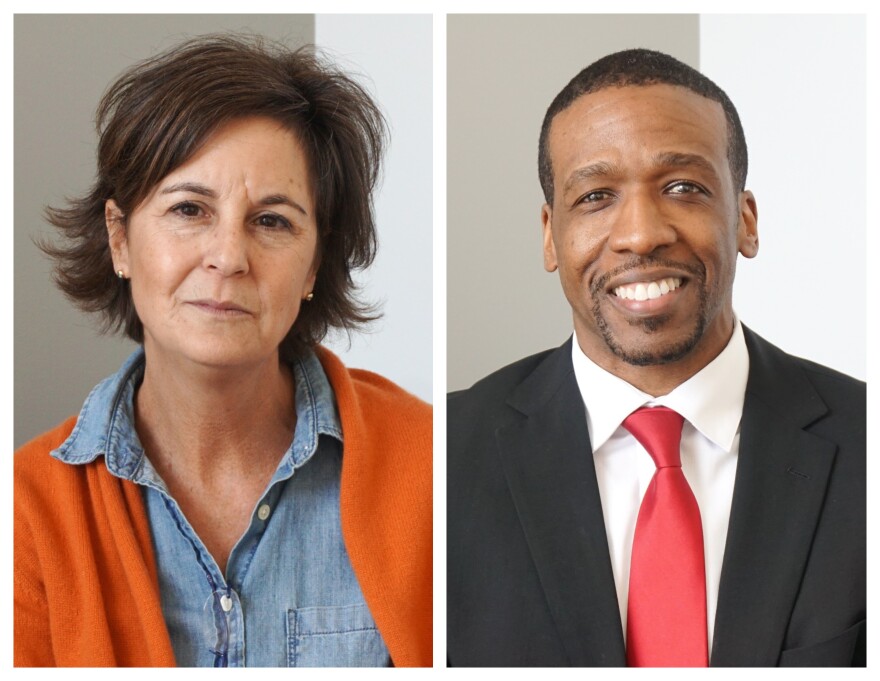The St. Louis-area teens with whom Debbie Greenberg interacts at College Bound are doing everything they’re supposed to do as they prepare to further their education – seeking out mentors, studying for college-entrance exams, gaining financial literacy and more.
But with a high-profile college-admissions scandal making headlines at the same time that institutions around the country are releasing decision letters to potential students, some of those local teens are also feeling “a sense of outrage,” Greenberg said on Monday’s St. Louis on the Air.
“There are still barriers, there are still roadblocks” for these high school students, she added, noting that the recent revelations about powerful parents using illegal means to get their children into elite schools are indicative of a much broader problem.
“We always knew this was happening … there’s always been an extra spot for students of privilege,” Greenberg, who is College Bound’s director of college counseling, told host Don Marsh.
Alan Byrd, dean of enrollment at University of Missouri-St. Louis, also participated in the discussion about longstanding disparities within college admissions and ongoing challenges within the industry.
Byrd acknowledged that big donors play a role not only at elite schools but even at public institutions where considerable focus on “protect[ing] our bottom line” competes alongside recruitment and academics.
“Students from families of wealth and students who have resources to possibly be donors absolutely get special consideration at times,” Byrd said.
Admission requirements vary by institution, and at UMSL “it’s much different [compared to] the elite schools, because they accept less than 20 percent of their applicants,” he added, describing admissions at public schools as “a more objective process” where students can calculate whether they’ll get in based on their ACT score, class rank and GPA.
“But there’s always that 10 to 20 percent exception rate where we do have some flexibility to make decisions in terms of who gets those spots and also in terms of scholarships,” Byrd explained. “That’s where it gets really, really tricky at times in terms of who is eligible for which awards. That’s the most difficult part.”
The system as a whole “sort of rewards [the] type of behavior” exhibited by the parents at the center of the recently publicized scandal, he added, “[creating] this environment where you almost … buy your way into college.”
Meanwhile, many institutions are struggling to make ends meet, both in the private and public sectors, even as an “arms race” is also underway, as Greenberg described it, with regard to swanky facilities as colleges and universities compete for students.
Byrd said he hopes a bigger discussion about “financing college” comes out of the attention to the recent college-admissions scandal.
“The financial-aid system has gone from being more need-based to more merit-based, and what's happened is we're using the majority of our institutional budgets to go after students with higher ACT scores,” Byrd said. “And we have a ton of students who now find themselves not being able to afford college because all the money has been shifting into the merit pot. But if we truly want to reach our full potential and provide opportunity for everyone, we have to have more balance between merit- and need-based aid.”
Such disparities run deeper than the expense of tuition itself, Greenberg noted, and solutions will have to take the entire “cost of attendance” into consideration.
“That’s what’s happening in New York right now,” she said. “Yeah, tuition’s free, but a low-income child still can’t go to [a] New York [state] college just based on tuition, because they can’t pay the full cost of attendance with room and board, meals, et cetera.”
When Marsh asked about the feasibility of recent political proposals calling for free college, Byrd said he expects to see more states follow Tennessee’s lead with its free-college program, the Tennessee Promise.
“As a country,” Byrd said, “we’re at a spot where we have such a shortage of adults with college degrees that we are going to have to change the system to enable more people to graduate from college.”
Greenberg also sees this cultural moment as an opportunity to remind the teens she works with that there’s more to life and school and work than getting into a top college – or not getting in, as the case may be.
“It’s about your journey, it’s about who you are,” she said. “You are not necessarily the name on the T-shirt you’re wearing or the decal on your car.”
“St. Louis on the Air” brings you the stories of St. Louis and the people who live, work and create in our region. St. Louis on the Air host Don Marsh and producers Alex Heuer, Evie Hemphill, Lara Hamdan and Jon Lewis give you the information you need to make informed decisions and stay in touch with our diverse and vibrant St. Louis region.




